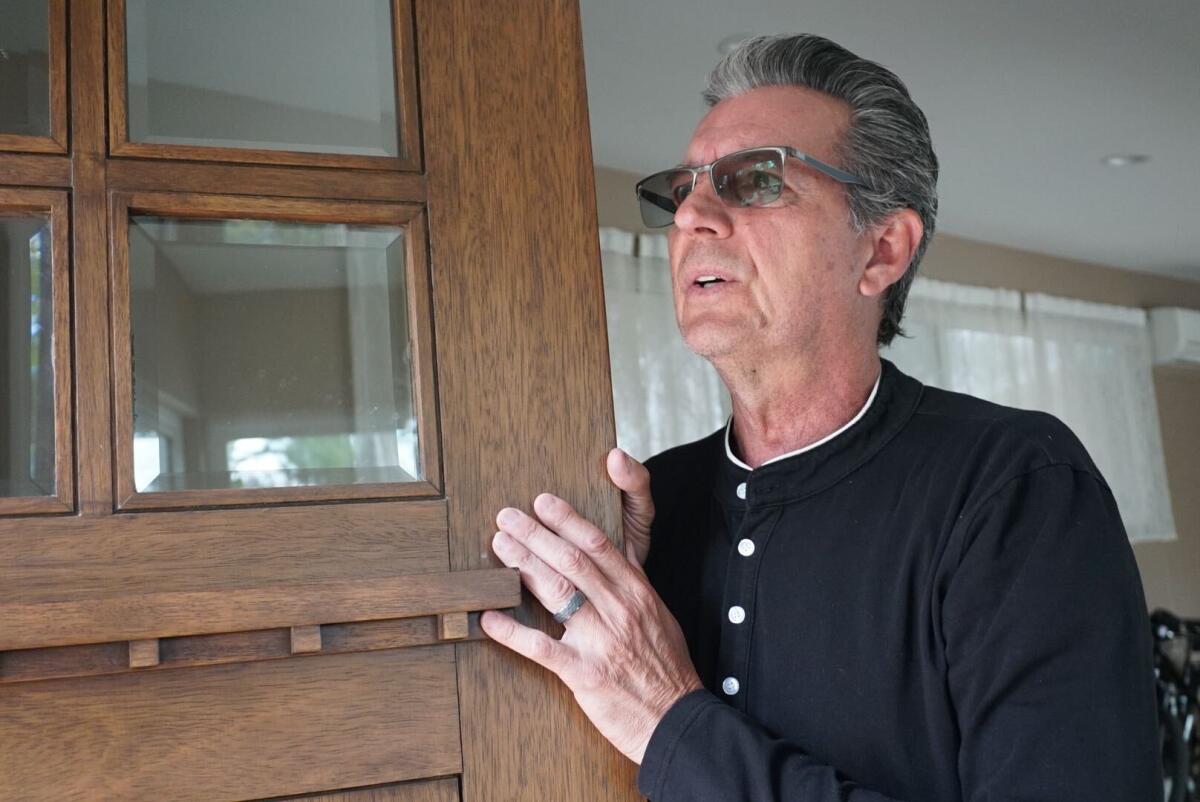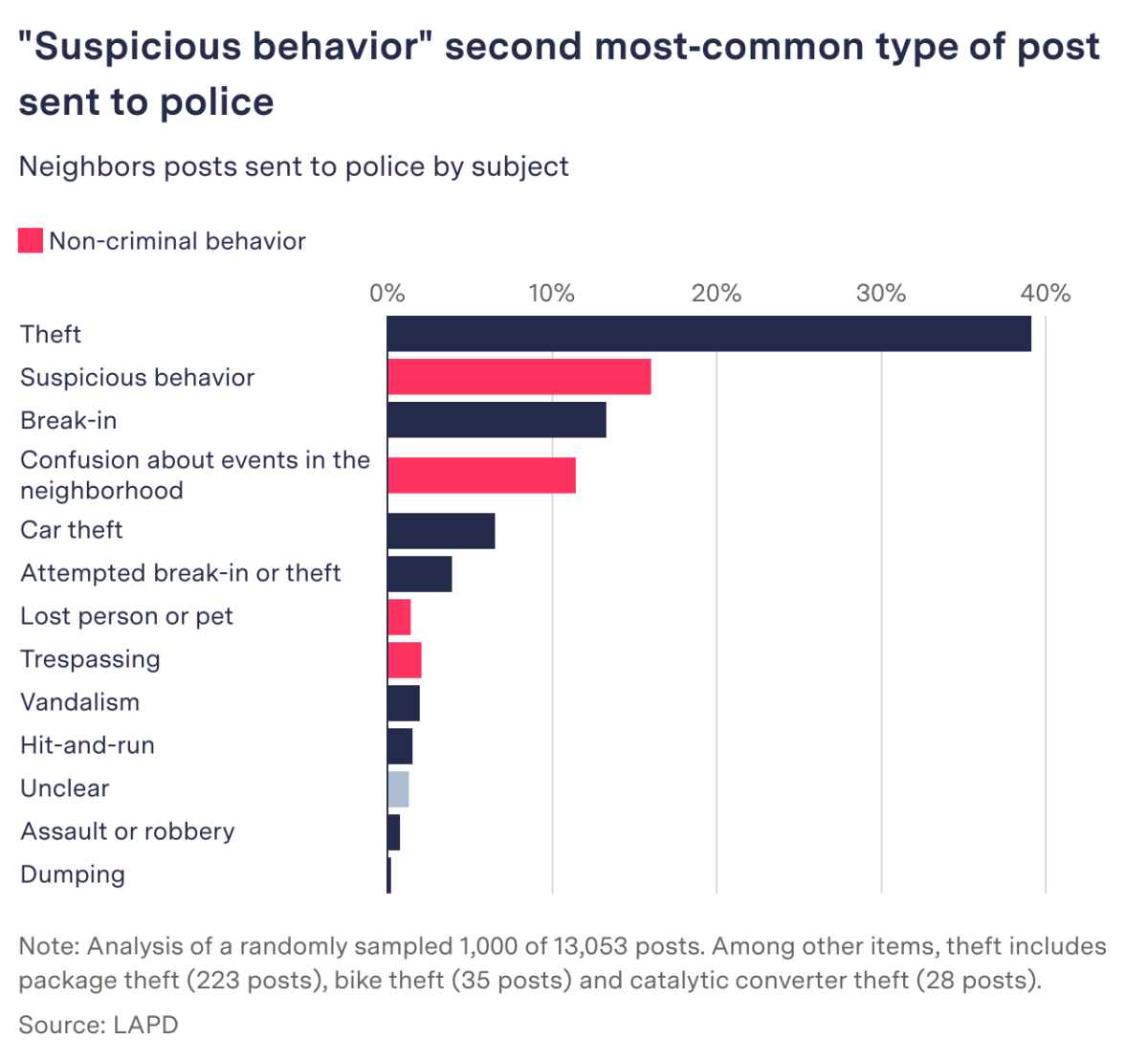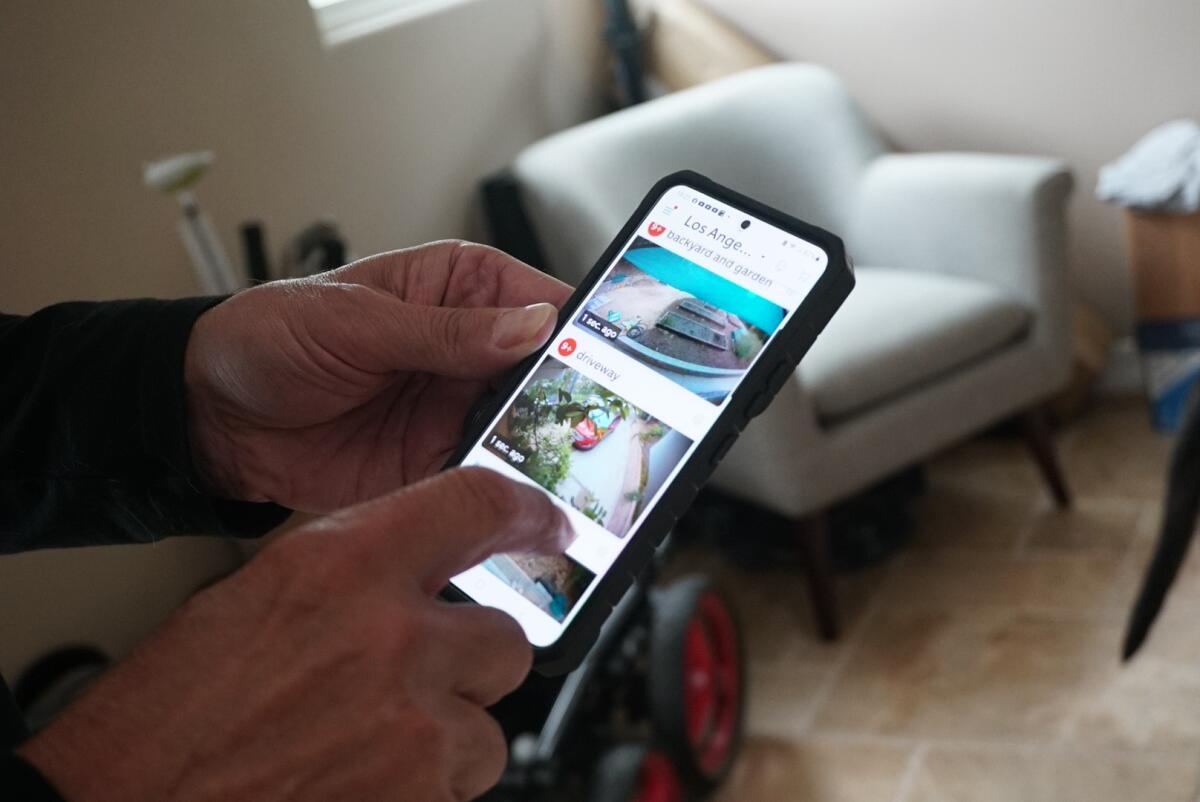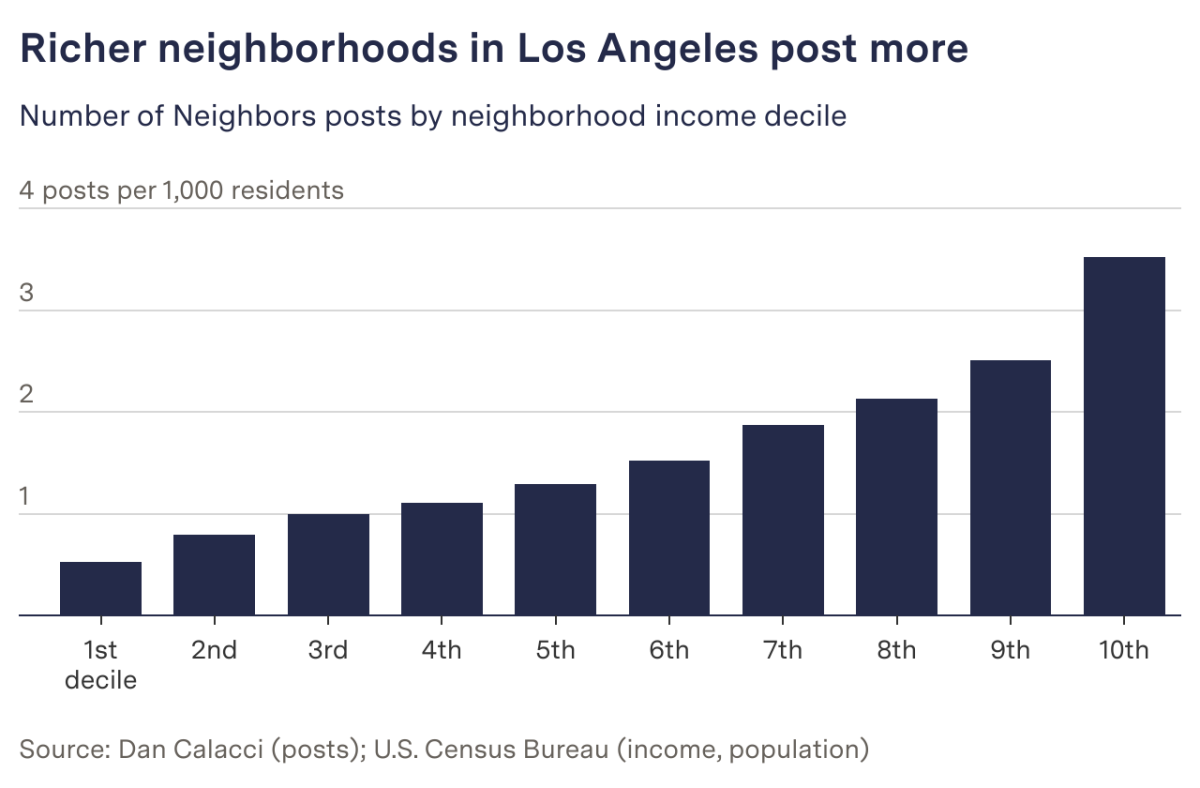Ed Dorini’s home sits on the finish of a cul-de-sac that snakes its approach up a hill within the Solar Valley space, one among Los Angeles’ northernmost corners. It’s a small enclave whose residents are just a little whiter and just a little wealthier than the remainder of Los Angeles. On this neighborhood, “individuals maintain their properties,” Dorini mentioned in an interview in his dwelling in late Might.
Dorini, 64, got here to L.A. as an immigrant from Canada within the early Eighties when he “actually had nothing” and constructed a enterprise in actual property. The house he owns is one he earned with arduous work, which incorporates transforming components of the home himself. He’s happy with it, and he’s intent on preserving it protected: Three years in the past, he put in 10 Ring cameras to watch his property and its numerous entrances.
“All people right here has weapons and canine. Folks aren’t afraid to make use of them, and I believe that’s in all probability a deterrent,” he instructed the Markup. “And cameras are, too.”

At instances, he’s additionally discovered Ring’s companion app, Neighbors, helpful. Each Neighbors and Ring are owned by Amazon, and the previous is a social platform the place Ring doorbell customers — and individuals who be part of the app independently — can publish posts and pictures about issues occurring of their neighborhood, similar to theft or lacking pets.
In February 2022, Dorini wrote two posts with accompanying movies about what he thought-about a security challenge: “Unlawful dumping onto [name of street redacted] drive. Anybody acknowledge this truck.” Ten minutes later, he wrote: “Anybody not too long ago have a rest room demoed by somebody with this massive dump truck. Name me.”
This text was co-published with The Markup, a nonprofit, investigative newsroom that challenges know-how to serve the general public good. Join its newsletters right here.
Each of those posts landed within the inbox of 15 officers with the Los Angeles Police Division who had opted in to obtain crime alerts posted on Neighbors. Dorini’s put up was one among greater than 13,000 Neighbors posts revealed by Angelenos that have been routinely forwarded to LAPD officers, detectives and sergeants in simply over two years, in keeping with e-mail correspondences that the Markup obtained through public data requests.
Neighbors has constructed a discussion board wherein non-public residents can monitor each other in service of preserving neighborhoods “protected,” as the corporate places it.
That raises necessary questions: Secure for whom, and from what? Whereas householders could imagine their cameras and posts are stopping break-ins and theft, some analysis has proven that surveillance is a poor deterrent of such property crimes. And by trusting their cameras to maintain look ahead to them, customers render themselves blind to the methods wherein neighborhood surveillance breeds paranoia, perpetuates prejudice and places individuals at heightened threat of police or vigilante violence.
In america, the place police disproportionately kill, hurt and jail Black, Latino and Indigenous individuals at a better price than white individuals, this interprets into an extra threat to individuals of coloration. That’s significantly true when, because the Markup’s evaluation of Neighbors posts in L.A. and analysis from different lecturers has discovered, its most energetic customers reside in whiter, extra prosperous areas.
Neighbors is “a continuation of a protracted historical past of communities coming collectively and creating their very own surveillance techniques that form who they imagine belongs someplace and who doesn’t belong someplace,” mentioned Ángel Díaz, visiting assistant professor at USC Gould Legislation College. “And that’s one thing that now we have enshrined not solely via regulation enforcement, however via legal guidelines round disorderly conduct and issues like that.”
The Markup labored with college students from the NYCity Information Service on the Craig Newmark Graduate College of Journalism at Metropolis College of New York to carry out the general public data requests (full disclosure: Craig Newmark can be a funder of the Markup).
Our evaluation of a random pattern of Neighbors posts discovered that greater than 30% of the posts the LAPD obtained didn’t describe legal exercise, even when customers categorized them as “crime.” The content material of those posts usually included habits residents deemed suspicious, similar to somebody “checking automobiles.” In keeping with emails between Neighbors workers and the LAPD, solely posts categorized as “crime” have been imagined to be forwarded to officers — however this didn’t all the time occur. Dorini, for instance, categorized his posts that landed in officers’ inboxes below “security.”

“Stories of suspicious habits are coded methods of claiming somebody doesn’t belong, which in lots of prosperous areas correlates with focusing on individuals of a special race,” Andrew Guthrie Ferguson, a professor of regulation at American College and creator of “The Rise of Massive Information Policing: Surveillance, Race, and the Way forward for Legislation Enforcement,” mentioned in an e-mail.
“In prosperous communities that depend on police to maintain out ‘the opposite,’ they are going to really feel extra snug reporting the suspicion,” Ferguson mentioned. “In much less prosperous communities which have extra advanced relationship[s] with the police, the choice to report suspicion shall be extra circumspect.”
As of September, 2,604 police departments throughout america have cast partnerships much like LAPD’s with Amazon’s Ring community. Along with that, 589 fireplace departments and 66 native authorities businesses have additionally signed on. It’s a part of a advertising technique at Ring that targets not simply retail prospects but in addition regulation enforcement businesses, with out all the time making the connection between police and Ring absolutely clear to its customers.
The Markup reached out to 24 customers whose posts have been forwarded to LAPD officers, and three individuals responded. None have been conscious that their info had been topic to police monitoring, although they’d differing views on the position of regulation enforcement.
One individual, Lenin, who didn’t need to give his final title, was stunned and mentioned it was “not cool” that LAPD was receiving these alerts.
The vast majority of individuals interviewed, nevertheless, have been unfazed.
“Truthfully, I don’t actually care both approach, you understand,” mentioned Dorini’s neighbor, Juan Longfellow. “Everybody has cameras. So, I imply, it’s sort of in all places. … I’m not a kind of individuals who’s afraid for my privateness or no matter.”
When the Markup instructed Dorini about Neighbors sending posts to police, he was delighted.
“I prefer it,” he mentioned. “If [police] acquired hundreds of different ears and eyes on the market, [helping] them get entangled with, you understand, coping with points — properly, for me, that’s a great factor.”
Ring‘s coverage is to not hand over footage from client doorbell cameras to authorities until they’ve a warrant or there’s a life-threatening scenario. Ring spokesperson Mai Nguyen mentioned that posts on Neighbors don’t reveal the addresses of customers or the Ring system’s proprietor. Footage and data posted on Neighbors, nevertheless, are allowed to be shared, in keeping with the phrases of service.
Furthermore, though Ring refers to its applications with police departments as “partnerships,” the LAPD’s spokesperson doesn’t see it as one.
“We don’t work particularly with RING. We work with residents, or whoever has a RING system, as a part of against the law investigation,” wrote Officer Drake Madison in an e-mail response to a question from the Markup. “Video surveillance is a superb software. Sadly, we is not going to be talking on the RING system at the moment,” he added in a closing e-mail.
‘A neighborhood factor’
In its ethnic and financial make-up, Dorini’s neighborhood is typical of these the place Ring digital camera customers are usually concentrated. Strolling within the neighborhood, safety techniques are prevalent — half of the 2 dozen properties on Dorini’s block have seen cameras.
Though crime charges ticked up between 2018 and 2022 in Los Angeles, they have been nonetheless properly beneath ranges within the Nineties, and the crime charges in Dorini’s space and adjoining neighborhoods remained the identical or decreased between 2018 and 2022, in keeping with a USA At this time evaluation of knowledge collected by the nonprofit Crosstown.

Ed Dorini checks his cameras utilizing the Ring app on his cellphone.
(Lam Thuy Vo)
The Markup analyzed the connection between revenue and Ring digital camera utilization utilizing a database of Neighbors posts from 2018 to 2020 that Princeton researcher Dan Calacci shared with the Markup. The Markup narrowed down the database, which consists of almost 875,000 posts, to solely Neighbors posts positioned in 25 of the largest cities within the U.S. the place Ring partnered with the police, and located that Los Angeles was amongst 4 cities the place customers in neighborhoods with greater revenue ranges tended to put up extra usually.
When the Markup additional analyzed Neighbors posts revealed in 2019 in Los Angeles, a good clearer development emerged: Richer areas of town posted roughly six instances extra on Neighbors than poorer areas.
A lot of what Dorini and his spouse would see on their Ring footage was wildlife — cheeky coyotes crawling via backyards or deer trotting alongside — nevertheless it was additionally a technique to control the property and preserve individuals from “monkeying round our home.” As he scrolled via the Ring app, it displayed reside feed after reside feed of the areas round him.
Being a Ring proprietor gave him a special profit, too, he mentioned. “We didn’t actually notice that it was going to have a community scenario. […] We seen that it began to turn into like a neighborhood factor.”
The neighbors on this block all know each other, and they’re going to usually work collectively to make sure their properties are protected, Dorini mentioned. As soon as, he mentioned, he and his neighbors used their safety digital camera footage to assist police observe down an alleged burglar who had walked via their backyards. Dorini mentioned he was unaware of whether or not the individual was accused of stealing of their neighborhood.
Elsewhere within the Solar Valley space, one individual wrote a put up in 2018 — which was categorized as “suspicious” — a few “Hispanic man with sleeping bag.” “Male Hispanic in his 20’s with a sleeping bag was hanging out by our driveway,” the put up learn. “Requested him to depart twice and he mentioned he had been mountain climbing and mentioned he used sleeping bag to take a seat on his hike. We instructed him to depart as he doesn’t belong right here and he acquired very aggravated, and a neighbor adopted him down the road. Please watch out!”
In response to questions from the Markup, Ring spokesperson Nguyen provided a press release offering an summary of Ring’s work with police and its content material moderation insurance policies.
“Ring doesn’t tolerate racial profiling and hateful content material in the case of content material on Neighbors,” Nguyen mentioned. “We’ve invested many assets to assist us ship on this dedication — Neighbors has strict neighborhood tips, educated moderators, person flagging capabilities, and different instruments in place to assist create a protected place for all members of the neighborhood. We immediate customers to overview their posts for potential bias earlier than submitting to Neighbors, and all content material submitted to our app is reviewed earlier than it’s revealed to assist guarantee it adheres to our neighborhood tips.”
Ring up to date its tips in 2021 to require neighborhood members to publish posts based mostly on actions they’ve noticed or recorded, quite than on suspicions. On the web site it mentioned that “Neighbors acknowledges that posts reporting considerations about a person will be influenced by implicit bias and profiling — even when unintentional.” It’s unclear how a lot of an effort Ring has made to make sure that individuals comply with these tips.
“The paranoia of any individual’s creativeness is making its approach into that of different individuals,” mentioned Díaz, the visiting regulation professor at USC, about neighborhood platforms like Neighbors. “And so, in the event you’re simply passively maintaining with alerts and skim them and transfer on along with your day, you get inundated with this worry that your neighborhood may be very unsafe, based mostly on unsubstantiated accusations which are oftentimes extra reflective of individuals’s personal prejudices than anything.”
Calacci’s evaluation of his personal database of Neighbors posts discovered that people who find themselves householders and reside in white “enclaves” (white neighborhoods surrounded by different white neighborhoods) usually tend to put up on the platform. His evaluation additionally confirmed that majority-white neighborhoods that are likely to name 311 to comb homeless encampments additionally put up extra on the Neighbors platform.
“Such calls bear the closest resemblance to the notion of neighborhood gatekeeping — they actually entail policing presence and belonging in a neighborhood,” Calacci wrote in his paper, which was revealed final 12 months.

In 2021, the Cease LAPD Spying Coalition audited the Police Division’s Suspicious Exercise Reporting (SAR) program, wherein neighborhood members have been inspired to report suspicious actions to assist officers forestall terrorism assaults. The coalition’s evaluation confirmed that near 60% of experiences have been filed in communities that have been predominantly white, and that roughly half of them have been deemed unfounded.
Hamid Khan, the coalition’s founder, mentioned applications like SAR present that police will usually hear from nameless voices from largely white neighborhoods. Expertise like Neighbors’ e-mail alerts to LAPD simply streamlines this course of, “in order that’s the place the license for racial profiling is available in,” he mentioned.
No alternative however to maneuver
Drive south from Dorini’s dwelling for about an hour — down to close Broadway and 92nd Road — and also you’ll end up the place Ernie Arzu lived when a Neighbors put up he wrote a few buddy’s lacking canine acquired forwarded to the LAPD.
His put up a few Yorkshire Terrier named Bella Dior was like many others in his neighborhood: Lacking animals posts made up about half of the 12 Neighbors posts the Markup was in a position to determine in Calacci’s database to be from his space. The neighborhood is 77% Latino and 19% Black; by comparability, Dorini’s is 64% white, 20% Latino, 12% Asian and a pair of% Black.
Just one put up from Arzu’s space of South Los Angeles was categorized as suspicious habits.
Arzu had purchased a Ring digital camera, largely to control his 15-year-old daughter who he mentioned “typically likes to sneak out,” however doesn’t examine in on the footage all that a lot.
Arzu is a Black private coach and caretaker, whose household is initially from Belize. He’s lived within the metropolis since 1986, when he moved there as a 10-year-old.
“I’ve been in L.A. for so long as I can keep in mind,” he mentioned.
The crime price in his neighborhood is 93 crimes per 1,000 residents, in contrast with the citywide common of 60 per 1,000 residents. However regardless of individuals who reside within the space experiencing extra crime than the typical Angeleno, Arzu mentioned that LAPD would hardly ever assist.
The one time Arzu referred to as the police when he was residing there was when he noticed “younger children” vandalize a neighbor’s dwelling. The police didn’t arrive on the scene till 5 hours after the decision, he mentioned. Arzu was doing yard work in his entrance yard when the officers arrived. As an alternative of searching for the teenagers who had destroyed his neighbor’s property, Arzu mentioned, they requested him for his ID, assuming he didn’t reside at his residence.
“[The LAPD] don’t actually mess with us. There’s nothing optimistic. And it’s nothing unfavorable,” he mentioned.
Previous analysis has proven that Black individuals expertise extra violence and harassment from police, in addition to harsher policing methods, than their white counterparts. Tufts College Assistant Sociology Professor Daanika Gordon describes how in additional prosperous, white neighborhoods, police act as “responsive service suppliers” whereas Black populations are concurrently oversurveilled and socially managed — to not point out uncared for and underpoliced in the case of emergency providers.
However the lack of assist additionally had a special impact: Arzu’s spouse would obsess over crime on Neighbors. She felt unsafe within the neighborhood, so Arzu and his household not too long ago determined there was no different recourse than to maneuver away.
“My spouse desires to maneuver. She [doesn’t] just like the neighborhood. There’s crime,” he mentioned. “I don’t see no crime, however apparently there may be. Then you understand, it’s just a bit quiet neighborhood to me.”
NYCity Information Service writers Randi Love, James O’Donnell, Ariana Perez-Castells, Natalia Sánchez Loayza and Paisley Trent contributed to this report.
This collection was made attainable via help from the Pulitzer Heart’s AI Accountability Community.
#Amazons #Ring #digital camera #community #alters #L.A #neighborhoods
